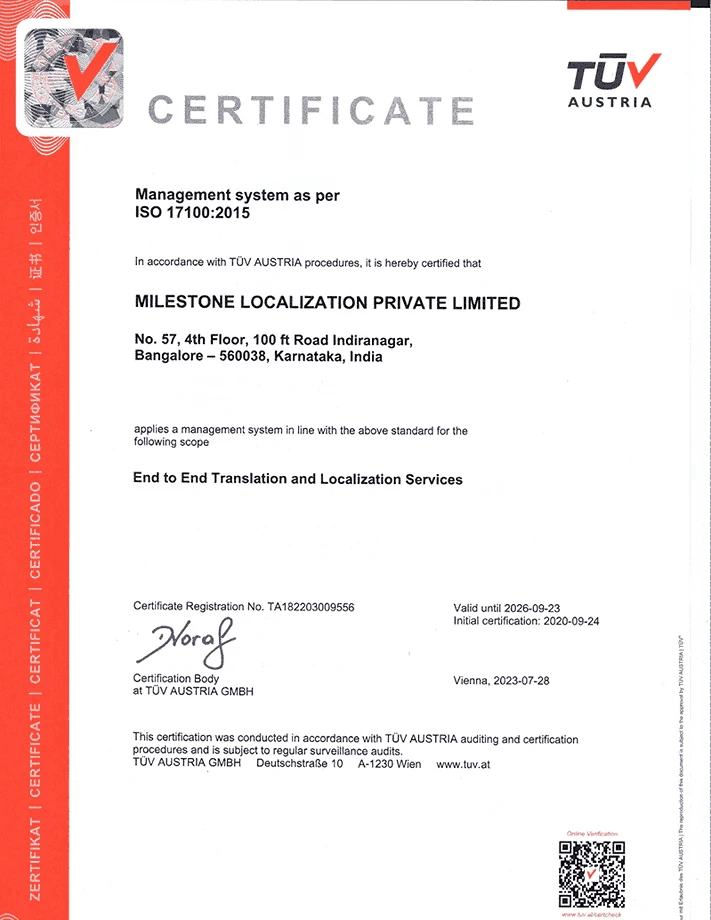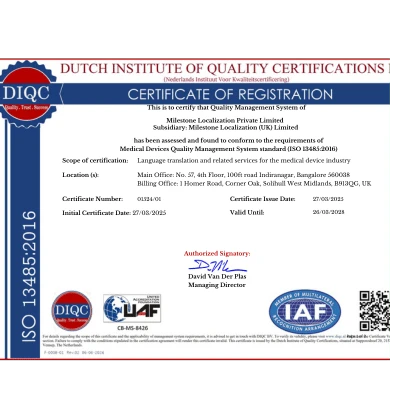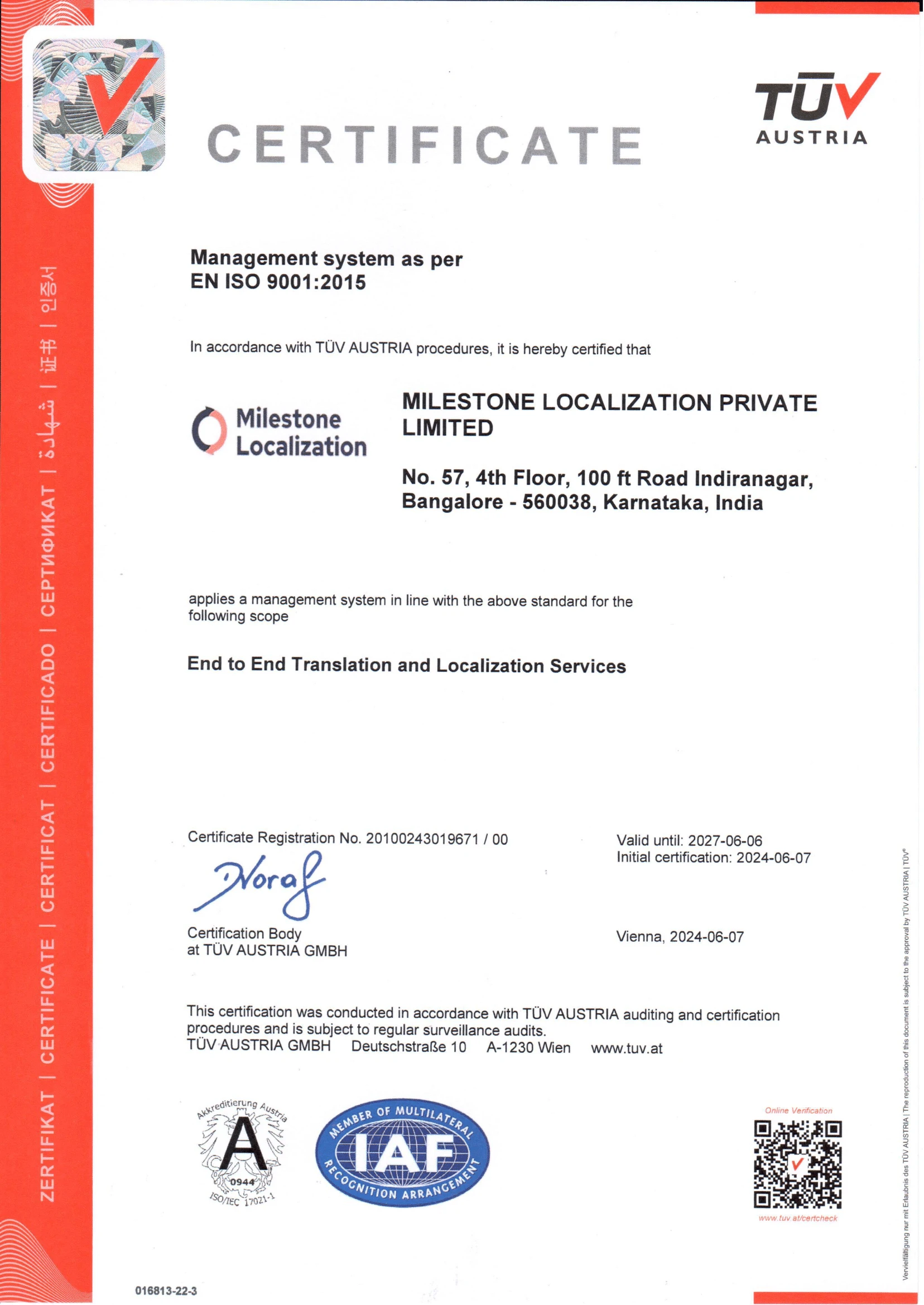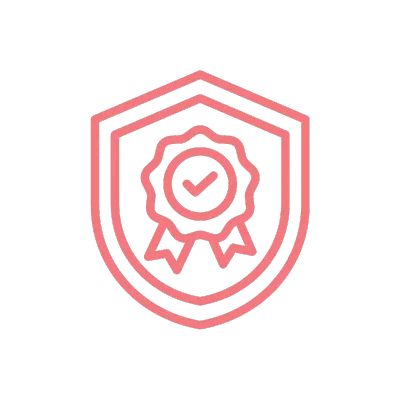Pharmaceutical Translation Services That Accelerate Global Market Entry
From clinical trials to drug commercialization, our specialized pharmaceutical translation services help you navigate complex regulatory requirements and reach patients worldwide faster.
Translations for your ICFs, PILs, SmPCs, protocols, labels and reports in 70+ languages.
Why Choose Our Pharmaceutical Translation Services?

ISO 17100:2015 and 9001:2015 certified agency
Trusted by 40+ global pharma & healthcare companies

Pharma translations by qualified professionals

Words translated for healthcare companies every year

Translation certificates that are globally accepted

Choose from over 70 languages
Our Pharmaceutical Translation Services
Our team of linguists has vast experience in translating healthcare and pharmaceutical-related content. We ensure to identify the best pharmaceutical translators who can meet your specific requirements and provide precise and reliable translations.
Informed Consent Forms (ICFs)
Drug Labels & Packaging
Investigator Brochures
Clinical Trial Protocols & Reports
Lab Reports
Patient Information Leaflets (PILs)
Summary of Product Characteristics (SmPC)
Standard Operating Procedures
Records and Reports
Quality Assurance & Control Documents
Compliance & Regulatory Documents
Training Documents
SMPC Translation Services
Our SmPC translation services help pharmaceutical companies ensure that all essential information about their medicinal products is conveyed clearly and accurately in any language. Our SMPC translations are essential for pharmaceutical product approval and distribution worldwide. We specialize in translating detailed product information, including composition, indications, dosage, side effects, and contraindications, ensuring clarity and consistency for healthcare professionals across diverse markets.
Our native translators, who have expertise in pharmaceutical terminology and industry regulations, provide translations that meet the stringent requirements of regulatory bodies such as the European Medicines Agency (EMA) and other global authorities. Our translations support pharmaceutical companies in achieving timely submissions, facilitating global market access, and maintaining patient safety with clear and culturally adapted communication.
Certified Pharmaceutical Translation Services
Many regulatory bodies in the pharmaceutical industry mandate translation certificates to verify the accuracy and authenticity of translated documents.
We specialize in providing certified translations for a comprehensive range of pharmaceutical documents, including clinical trial reports, regulatory submissions, labeling, packaging inserts, patents, and patient information leaflets.
Our translation certificates are globally recognized and accepted by regulatory authorities such as the FDA, EMA, and others.
We adhere to ISO 17100 and ISO 9001 standards, implementing rigorous quality assurance processes to guarantee the highest level of accuracy and compliance.
You can trust that our translations meet the highest standards, ensuring seamless acceptance by all relevant bodies and providing you with complete assurance.
Need For Accurate Pharmaceutical Translation Services
1. Regulatory compliance
Pharmaceutical companies must adhere to strict regulations set by various global authorities. Precise translations of regulatory submissions, clinical trial documents, and labeling are essential for obtaining approvals and ensuring compliance.
2. Access international markets
As pharmaceutical companies enter new markets, they must translate product information, marketing materials, and patient leaflets into local languages to meet market-specific requirements and effectively reach a global audience.
3. Patient Safety and Communication
Ensuring the clear and accurate translation of patient information leaflets, dosage instructions, and consent forms is necessary for patient safety and effective communication between healthcare providers and patients across different languages.
4. Protection of Intellectual Property
Translating patents and other intellectual property documents is important for securing patents and protecting innovations in multiple jurisdictions.
5. Global Clinical Trials
International clinical trials involve participants from diverse linguistic backgrounds. Translating informed consent forms, study protocols, and patient questionnaires is essential for ethical compliance and participant understanding.
Trusted By Global Organizations In The Life Sciences Industry
We have earned the trust of leading organizations worldwide to handle their language translation needs. Our team of experts is committed to delivering accurate and effective translations that exceed your expectations.
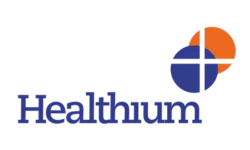
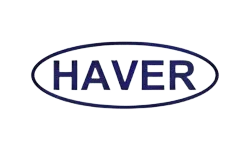





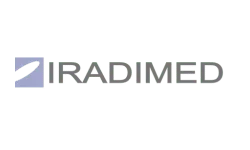
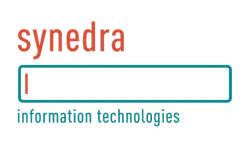


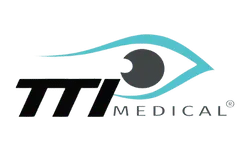
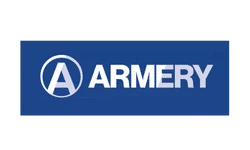
Testimonials
Hear From Our Clients In The Life Sciences Industry
“As a medical device company, we transitioned to EUMDR compliance in 2022 and needed translation on our IFUs in 22 international languages. We found Milestone Localization was best suited to do this work for us. Since then they have been our regular translation service provider with 100% on-time delivery of documentation.”

“Exceptional service. Quick. Exceeded my goals by a mile. Would definitely choose to work with them again.”

“We delighted to share our positive experience with Milestone Localization. Over the course of several projects, their translation services have proven invaluable to our team. Milestone Localization consistently demonstrates a high level of professionalism, and their commitment to delivering accurate and timely services is commendable. The team’s expertise shines through in every project they handle. Their skilled translators consistently provide top-notch results, making them trusted partner.”

“Our experience with Milestone Localization has been highly satisfactory. They have met our expectations. One aspect we really appreciate is their prompt responsiveness. Whenever we’ve had questions or needed assistance, they have been quick to respond and provide support. This level of responsiveness has made working with them a breeze. In terms of quality, we’ve found their translations to be accurate and appropriate for our high needs. Moreover, we greatly appreciate their professionalism. Prior to starting each translation, they consistently ensure alignment with our requirements and meticulously check various aspects such as terminology lists and style guides. Their professionalism and prompt service is very much valued, and we can only recommend their services.”

Our Pharmaceutical translation services are avaiable in 70+ languages
Spanish
Bulgarian
Croatian
German
Portuguese
Lithuanian
Estonian
Italian
French
Japanese
Chinese
Hindi
Our 6-Step Pharmaceutical Translation Process

1. Project Scoping and Planning
By gathering detailed information on the types of pharmaceutical documents involved, such as Clinical Study Reports, regulatory submissions, etc., and confirm specific client goals.
2. Terminology Setup
We create a custom translation style guide and glossary tailored to the pharmaceutical industry. This includes defining industry-specific terminology, drug names, dosage instructions, and regulatory language, to ensure consistency across all translated materials.
3. Translation and Proofreading
Our team of professional and qualified pharmaceutical translators, will translate the content. It is then proofread by another expert to verify accuracy and adherence to industry standards.
4. Quality Assurance Check
We perform a rigorous internal quality assurance check, following our detailed QA checklist. This process includes validation against regulatory compliance requirements, technical accuracy, and adherence to the custom style guide and glossary.
5. Delivery and Client Review
We deliver the translated documents for review. This stage allows you to assess the accuracy and suitability of the translations in the context of your specific regulatory and marketing needs.
6. Final Revisions and Integration
We incorporate feedback into the final documents, ensuring that all revisions are accurately made. This step guarantees that the final deliverables are precisely aligned with expectations and ready for regulatory submission or publication.
What To Look For In a Pharmaceutical Translation Agency
Certified translation agency
Look for a pharmaceutical translation agency that have ISO 17100 and ISO 9001 certification. These agencies have strong quality management procedures in place to ensure the accuracy of pharmaceutical translations.
Regulatory document handling
Check if the provider has experience with translating regulatory documents such as clinical trial reports, drug labels, packaging, etc., to ensure they can manage complex and high-stakes documents effectively. Additionally, they should be familiar with guidelines for regulatory submissions.
Pharmaceutical translation expertise
Ensure that your pharmaceutical translation agency has significant experience in translating different types of content for the pharma sector, as it requires a thorough understanding of concepts and terminology.
Quality assurace process
For pharmaceutical translations, quality is of prime importance. Ensure that the translation agency has strong quality assurance processes. This should encompass proofreading, editing, quality analysis, and, when necessary, back translations to guarantee the accuracy and high quality of the translations.
Native translators
Choose a pharmaceutical translation agency that works with qualified professional linguists experienced in translating pharmaceutical documents to ensure accurate pharmaceutical translations.
Globally recognized translation certificates
Translation certificates are important in confirming the accuracy and authenticity of pharmaceutical translations. It is also a requirement by various regulatory bodies to accept the translations. So, ensure that the translation agency provides translation certificates that are recognized internationally.
Expert Insights: Translations for The Pharmaceutical Industry
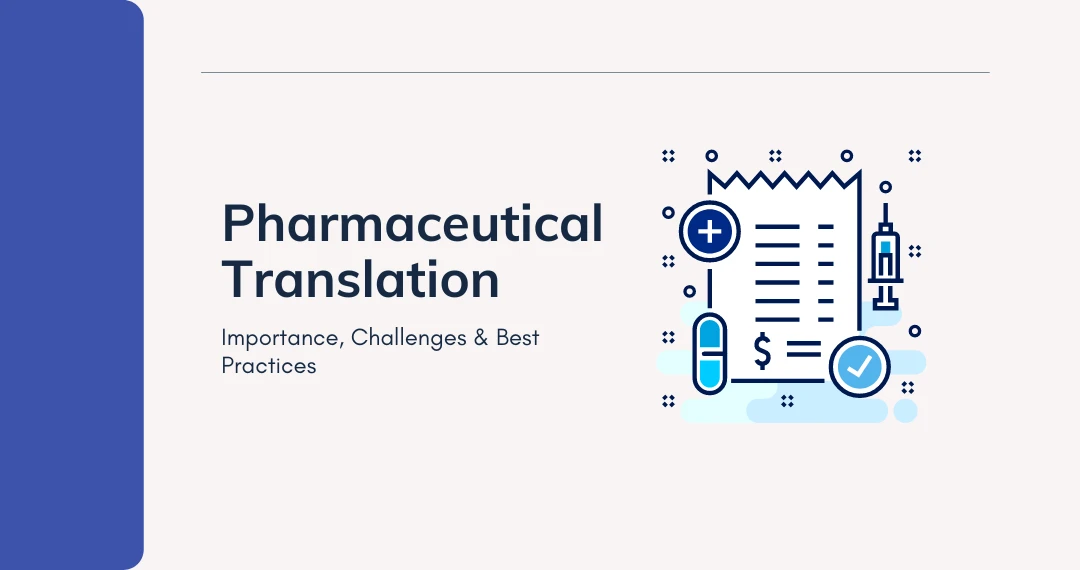
Pharmaceutical Translation Importance, Challenges & Best Practices
Both the biotechnology and pharmaceutical markets are currently experiencing substantial growth, which was significantly accelerated by the pandemic. According to statistics from Data Bridge Market Research, the value of the biotechnology market is expected to grow from £739.52 billion in 2022 to an astonishing £7,337.04 billion by 2030. This growth represents a compound annual growth rate (CAGR) of 29% during this period.
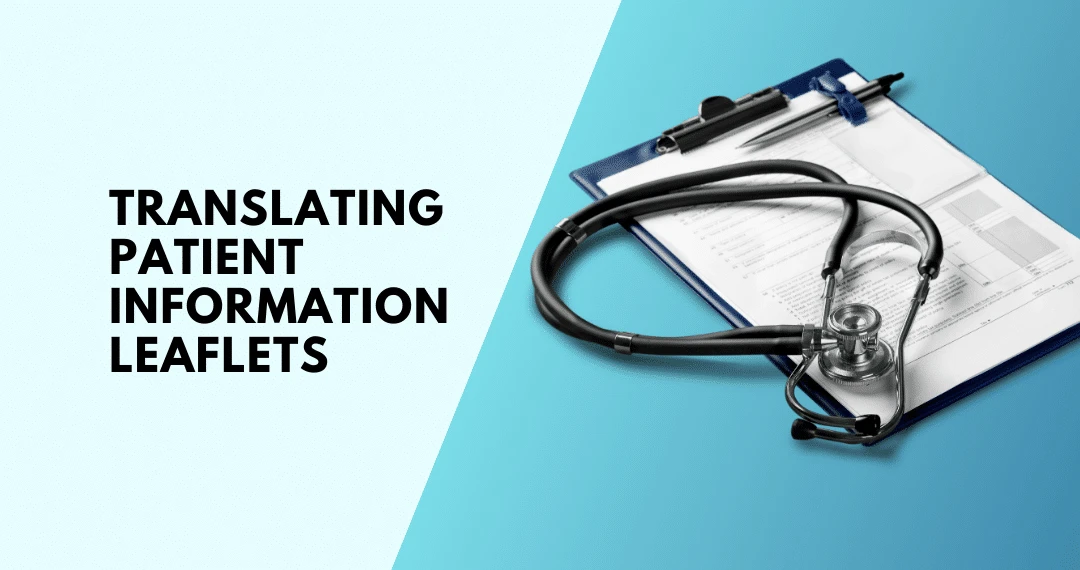
Translating Patient Information Leaflets: Challenges and Solutions
In today’s globalized world, access to healthcare and medication is oftentimes hindered by language and cultural barriers. Patient Information Leaflets Translation, which is a type of medical translation, is instrumental in helping people make more informed decisions about their health. Patient Information Leaflets (PILs) are essential for guiding patients on the safe and effective use of their medications.
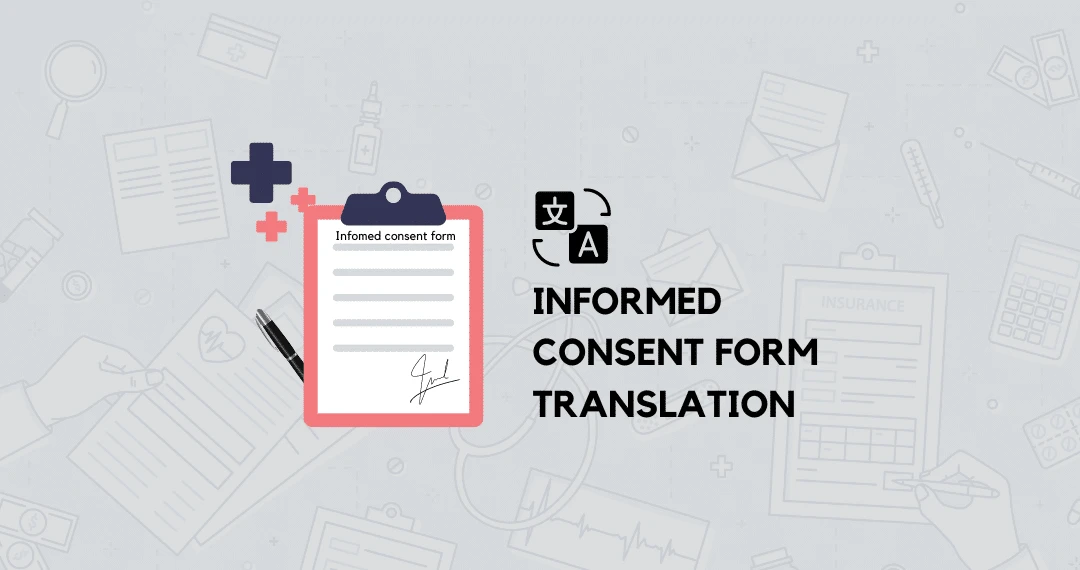
ICF Translation: Importance, Requirements & Best Practices
Informed consent is a fundamental ethical principle in research that ensures that participants or the subjects of the study fully understand the nature of the study and voluntarily agree to participate. It involves providing individuals with comprehensive information about the research study, including its purpose, procedures, potential risks, and benefits.
Get in touch
Our team is ready to help you with your pharmaceutical translation needs
FAQs ON PHARMACEUTICAL TRANSLATION SERVICES
What types of documents typically require pharmaceutical translation services?
Pharmaceutical translation services are required for a wide range of documents, including but not limited to packaging and labeling, regulatory submissions, marketing materials, patents, manufacturing process descriptions, and pharmacovigilance reports.
What qualifications do your pharmaceutical translators have?
Our pharmaceutical translators are not only native speakers of the target language but also have advanced degrees in life sciences, pharmacy, or related fields. They possess a minimum of 5 years of experience in translating pharmaceutical documents.
Can you handle large volumes of pharmaceutical translations?
Yes, we are well-equipped to handle large volumes of pharmaceutical translations with our scalable resources, experienced project managers, and efficient workflow processes. We prioritize timely delivery without compromising on quality.
How do you ensure regulatory compliance in pharmaceutical translations?
Our translators are well-versed in the specific requirements of each country and ensure that the translations meet all necessary standards and regulations.
Can you provide back-translation services?
Yes, we provide back-translation services to verify the accuracy and equivalence of the original and translated texts.
How do you handle updates or revisions to previously translated pharmaceutical documents?
We handle updates or revisions to previously translated pharmaceutical documents by maintaining comprehensive translation memories and glossaries for each client. This ensures consistency and accuracy in all subsequent translations, and we can quickly incorporate any changes or updates.
Do you provide support for pharmacovigilance reporting translations?
Yes, we provide support for pharmacovigilance reporting translations. Our services cover adverse event reports, safety data sheets, risk management plans, and other pharmacovigilance documents to ensure accurate and timely reporting to regulatory authorities.
What are the key challenges in pharmaceutical translation?
Challenges include complex medical terminology, strict regulatory compliance, maintaining accuracy across multiple languages, and ensuring confidentiality of sensitive data.
Is your pharmaceutical translation process ISO-certified?
Yes, our processes follow ISO 17100 and ISO 9001 standards, ensuring professional quality, traceability, and confidentiality throughout the translation lifecycle.
Do you follow EMA QRD templates when translating SmPCs?
Yes. We strictly follow the latest EMA Quality Review of Documents (QRD) templates to ensure structure, terminology, and formatting align with European regulatory standards.
What should I look for in a pharmaceutical translation agency?
Look for an agency with native-speaking medical translators, industry experience, ISO 17100 or 9001 certifications, a strong QA process, and knowledge of regulatory requirements in your target markets.


